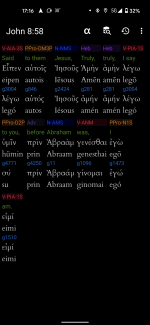I'm having to review where we were on this.
You're saying that Jesus is equating Himself with God, and because God is timeless, Jesus is claiming to be timeless.
(the other option is that Jesus is NOT equating Himself with God, and is not claiming to be timeless.)
If God is "timeless", then Jesus' claim might inherently mean He's claiming timelessness, but the passage doesn't make that claim directly.
So it can't be used as a proof for the timelessness of God, anymore than every other instance of "I AM".
There are some significant problems with a "timeless" God, such as that Jesus is still on the cross, and that God, having forsaken Jesus still on the cross, is forever in a state of forsaking Him.
I suppose that still might be the case, but the bible doesn't support it, anymore than Jesus, using a time-sequence description, was claiming to do things out of sequence. I.e. if Jesus had claimed that Abraham's almost-sacrifice of Isaac was on schedule for the next day when talking to the Pharisees, in contradiction to the biblical account, and we had to recognize both sources as equally accurate, then it would point to a timelessness.

